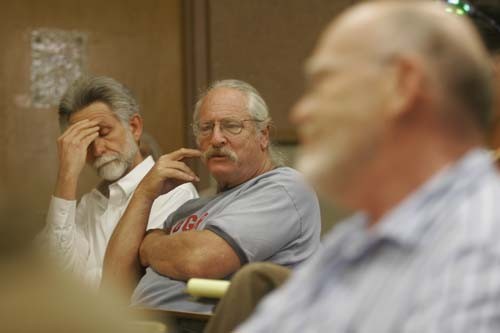While many voices were heard at the faculty forum Thursday, a plan of action to address the administration’s handling of the UA transformation was not agreed upon.
Approximately 40 faculty members attended the meeting, sponsored by the Faculty Senate, to discuss the implications of a faculty poll that showed faculty doubts in the leadership of President Robert Shelton and Provost Meredith Hay.
In response to the faculty forum held last month, the UA Faculty Center created an anonymous poll to gauge faculty members’ opinions on communication between the upper administration and the faculty amid the UA transformation process.
The poll went live online from Sept. 18 to Sept. 25. Faculty members in attendance expressed concern over whether or not the administration will be willing to reengage the faculty in determining future plans for the budget.
Lynn Nadel, chair of the Strategic Planning and Budget Advisory Committee, said the faculty poll raised concerns about the administration, however the administration’s response was not one the senate was particularly happy with.
“”I don’t know if it is possible to imagine at this point the kind of change that would reverse the decisions that have been made,”” Nadel said.
Many of the faculty in attendance called for a concrete plan of action to address what they perceived as the administration’s inadequate response to the faculty poll.
Only 31 percent of voting-eligible faculty participated in the poll, although the total number includes hundreds of emeritus faculty.
About 43 percent of on-campus faculty took part in the poll. Fifty-four percent of voters said they held little-to-no support for the way Shelton has carried out the transformation process, while 74 percent expressed little-to-no support for Hay.
Jacqueline Sharkey, director of the School of Journalism, said the shared governance laws that determine the Faculty Senate’s role in the transformation process do not give the faculty the power it needs.
She made several suggestions to help voice of the faculty be heard. These included a more specific poll that does not take into account emeritus faculty and a public statement expressing the Faculty Senate’s lack of involvement in the transformation process.
Sharkey said the cuts go beyond what is necessary for strictly budget reasons. “”What is going on now is not budget cuts but overcuts,”” said Sharkey. “”Some units are being cut more in order to reallocate resources to units the president and provost prefer,”” she said.
Some faculty members in attendance said while they recognized the necessity for making differential cuts, specific guidelines are needed.
Associate professor of English Fenton Johnson said, “”We can’t make 7 percent cuts in humanities unless we have some kind of framework to work in. This framework has been absent from conversations with the presidents.””
In addition, faculty members at the forum discussed what values they felt a public, research, land grant university should follow when faced with large budget cuts.
“”We can’t wait for some visionary president, we are connected to the heart and soul of the university we should formulate a vision,”” said associate professor of geography Marvin Waterstone.
In order to support such a vision, Waterstone suggested the faculty convey the effects of the budget cuts to students and their parents who in turn could help to mobilize the legislature. He further added that the senate leadership must convey to faculty members that they have tried and failed to communicate with the president and provost.
While many in attendance were in favor of some form of action against the administration, faculty leadership at the meeting cautioned against any hasty decisions.
Faculty Chair Wanda Howell said it’s to soon to have another poll.
“”There is no hope of changing the reality of today,”” said Howell. “”We need to hold the administration accountable in a manner that truly honors shared governance.””









